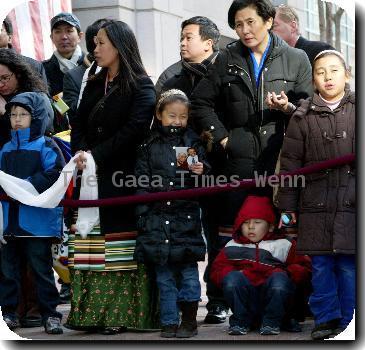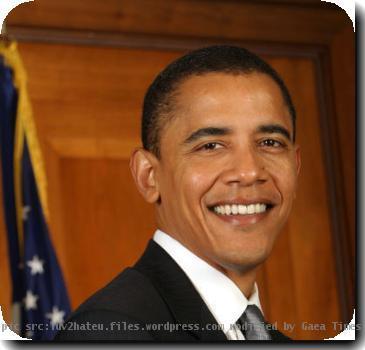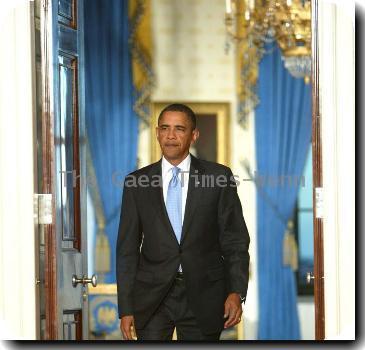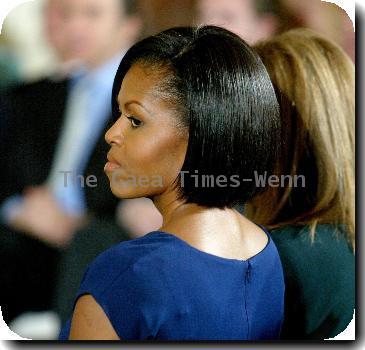National Republicans, Democrats target Hawaii district for gains in Congress
By Mark Niesse, APSaturday, April 24, 2010
Obama’s home congressional district in play
HONOLULU — Republicans believe they’ve seen this movie before: Campaign ads blanketing the airwaves. Money from national political parties flowing in. And polls showing their candidate virtually tied with the competition.
The plot played out in another Democratic stronghold, Massachusetts, in January with the election of a little-known Republican state senator to the late Ted Kennedy’s Senate seat.
The GOP hopes it can build on that win in Hawaii’s upcoming special election for the 1st Congressional District seat representing urban Honolulu — President Barack Obama’s hometown.
“The people of Hawaii have this clear opportunity to speak to the American people about whether or not we’re satisfied with the status quo in Congress,” Honolulu councilman and Republican candidate Charles Djou said.
Democrats believe the May 22 election to serve the remainder of the term of U.S. Rep. Neil Abercrombie, who resigned to run for governor, will end as it has here for 20 years — with a Democratic victory.
With two Democrats also running for the seat, however, there’s a chance they could split the vote and Djou could squeak by with a plurality and add to GOP confidence heading into the fall’s midterm elections.
Democrats are not taking any chances as they hope to hold onto seats in this off-year election where the party in power generally loses seats.
“It’s a Democratic district, and we’re committed to making sure it remains Democratic,” said Andy Stone, a spokesman for the Democratic Congressional Campaign Committee.
The group aired ads and blasted e-mails criticizing Djou but hasn’t highlighted either of the Democratic candidates — former Congressman Ed Case and state Senate President Colleen Hanabusa.
While Republicans hope to use a victory as a harbinger of wider Democratic loses in November, the biggest factor influencing the race may be a long-standing internal Democratic Party dispute.
Case, a 57-year-old moderate Democrat and cousin of former AOL chairman Steve Case, held a rural Hawaii congressional seat and rankled party leaders in 2006 when he challenged longtime U.S. Sen. Daniel Akaka.
In a state where newcomers are expected to wait their turn and run for higher office until an incumbent decides to step down, Case questioned the then-82-year-old Akaka’s fitness for office.
The tension remains today, with U.S. Sen. Daniel Inouye, D-Hawaii, endorsing Hanabusa instead of Case, his former colleague in Congress.
National Democratic organizations have signaled that Case is their pick, believing that he’s more electable than the more liberal Hanabusa.
Case acknowledged he’s received help from the DCCC while Hanabusa said she hasn’t talked to them since last year. Hanabusa, the first Asian-American woman in the country to lead a legislative body, has the backing of Hawaii’s most powerful Democrats and labor unions.
Djou, who has built a reputation on voting against taxes, has taken advantage of the situation by speaking out against Washington Democrats’ attack ads and their meddling in Hawaii’s race.
The GOP is hoping Djou could continue the trend started in Massachusetts when voters elected Scott Brown.
“It’s obvious to everyone that the national Democrats have come in and started to play in a state that doesn’t usually welcome outsiders from Washington,” said Joanna Burgos, a spokeswoman for the National Republican Congressional Committee. “They created a lot of this infighting.”
Case said Republicans are trying to divide the Democratic vote between him and Hanabusa.
“They have made no bones whatsoever by saying this election is about embarrassing and defeating President Obama in his hometown,” Case said. “Supporting Hanabusa is really indirect support for Djou, and he and his national handlers know that.”
Djou, a 39-year-old Army Reserve captain who joined up six weeks after the Sept. 11 terrorist attacks, argues that Hawaii voters could send a message that they’re fed up with taxes, government waste and mounting federal debts.
Hanabusa, 58, said she will use the lack of support from national Democrats to her advantage.
“What’s becoming evident is that I am the local candidate. I am the one with the local support base, and that’s what’s going to make the difference,” said Hanabusa, who represents one of Oahu’s poorest regions in the state Senate.
Democrats have controlled the Honolulu district since 1991, when Abercrombie won it to succeed Republican Pat Saiki. Abercrombie’s resignation in February triggered the special election to fill the vacancy.
Whoever wins this special election will have to run again in this fall’s primary and general elections.
The structure of the regularly scheduled elections benefits the Democrats because the leading Democrat will likely face Djou in a head-to-head match, and there will be no chance of a three-way split.
On the Web:
Ed Case: www.edcase.com/
Charles Djou: www.djou.com/
Colleen Hanabusa: www.hanabusa2010.com/
Tags: Barack Obama, Hawaii, Honolulu, North America, Political Organizations, Political Parties, Political Resignations, State Elections, United States, Voting Districts






